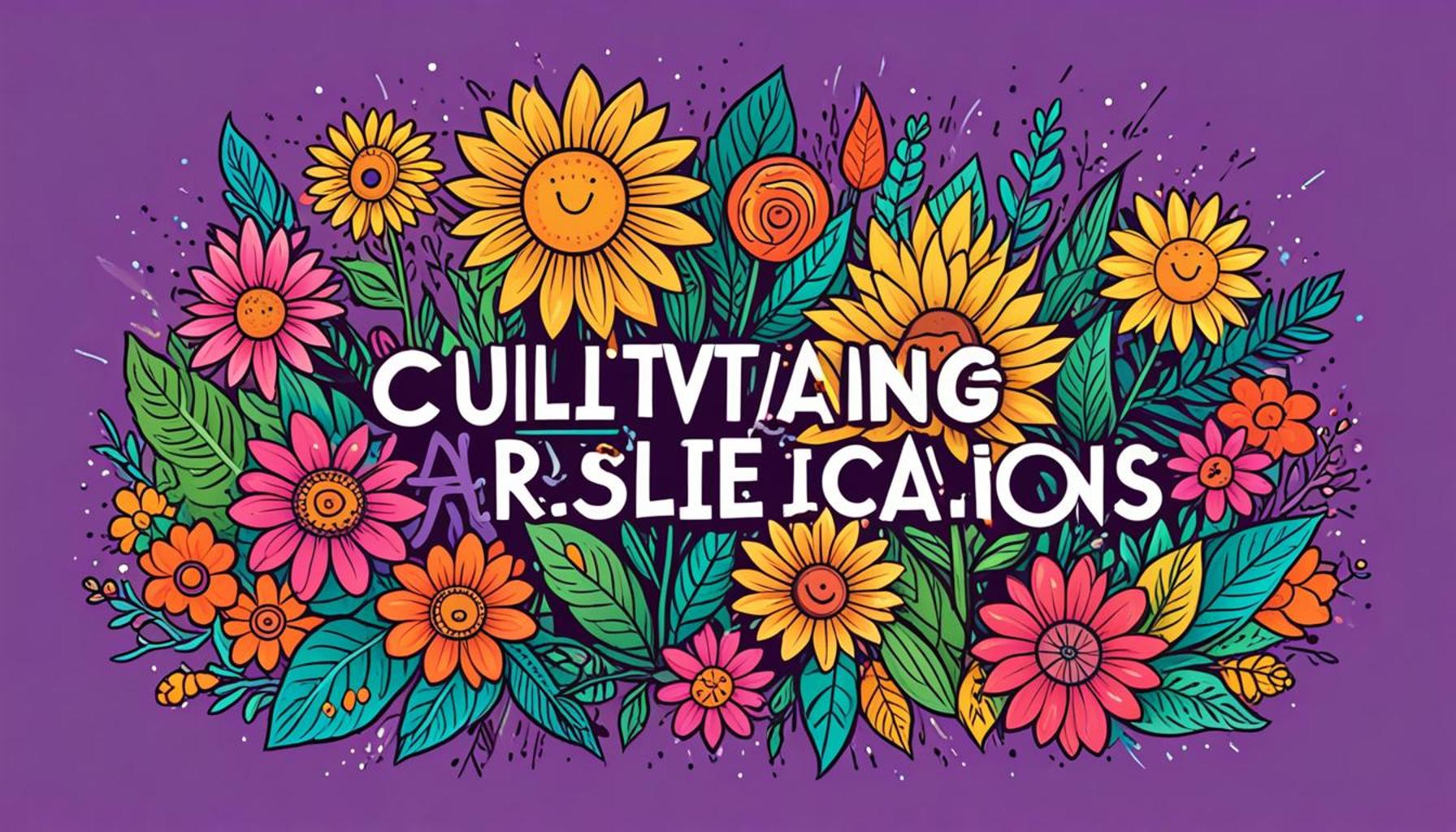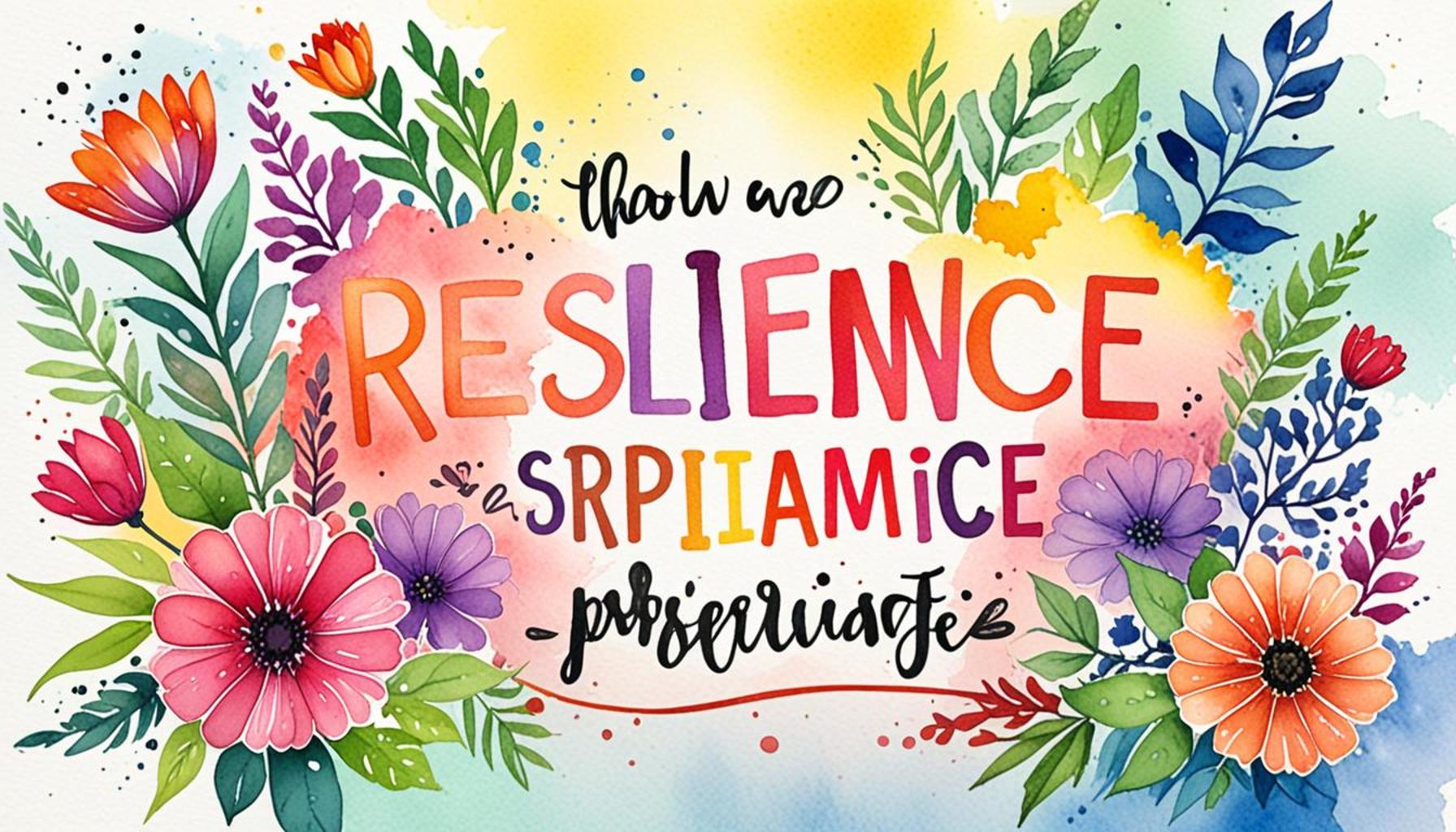The Importance of Positive Affirmations in the Emotional Resilience of Young Adults

Building a Stronger Mindset
In today’s fast-paced world, young adults face countless challenges that can impact their mental health and emotional stability. The pressure to succeed academically and socially can create overwhelming feelings of anxiety and self-doubt. One powerful tool that has emerged as a means of combating these struggles is the use of positive affirmations.
Understanding Positive Affirmations
Positive affirmations are simple, positive statements aimed at reshaping the way individuals think and feel about themselves. By consciously repeating these affirmations, one engages in a process of self-encouragement that fosters resilience and self-confidence. Here are a few key aspects:
- Reinforcement of self-worth – Regularly repeating affirmations can fortify one’s self-esteem. For instance, young adults in Lagos might affirm to themselves, “I am capable of achieving my dreams,” thereby building a solid foundation of belief that can encourage them to take on challenges, such as job interviews or competitive exams.
- Stress reduction – Positive thoughts can minimize feelings of anxiety and stress. By incorporating daily affirmations such as “I am in control of my emotions” or “I can handle whatever comes my way,” students can face examinations with a more composed mindset, ultimately leading to better performance.
- Enhanced focus – Affirmations help redirect attention towards goals and aspirations. For instance, during times when distractions abound, a young adult may remind themselves, “I am focused on my studies and committed to my success,” which can help maintain clarity and perseverance amidst chaos.
The Role in Emotional Resilience
For many young adults in Nigeria, where societal expectations can feel heavy, positive affirmations have become instrumental in developing emotional resilience. This resilience is often tested by issues such as unemployment or the pressure to excel in academia. Affirmations do not merely promote self-belief; they can also act as a vital coping mechanism during troubling periods.
Consider the student preparing for the Joint Admissions and Matriculation Board (JAMB) exams. With intense pressure from family, peers, and society, affirmations like “I am well-prepared and capable of success” can provide a sense of calm and motivation. Over time, this practice empowers young individuals to embrace challenges instead of viewing them as insurmountable obstacles.
As we dive deeper into this topic, it becomes essential to understand how implementing positive affirmations can lead to a stronger, more resilient generation capable of overcoming life’s hurdles. Embracing a mindset rooted in positive self-affirmation not only nurtures individual well-being but also creates a ripple effect that can uplift entire communities. In a world where uncertainties loom large, the habit of reciting affirmations can lead to a culture of positivity and strength that resonates far beyond personal development.

CHECK OUT: Click here to explore more
The Mechanism Behind Positive Affirmations
The effectiveness of positive affirmations lies in their psychological mechanism, which can significantly influence young adults’ emotional resilience. Understanding how these affirmations work is vital for anyone seeking to strengthen their mental health amidst the pressures of daily life. At the forefront of this understanding is the concept of neuroplasticity—the brain’s ability to reorganize itself by forming new neural connections throughout life. This means that with regular repetition of positive statements, individuals can actively reshape their thought patterns and emotional responses.
The Science of Affirmation
Research reveals that when young adults engage in positive self-talk and affirmations, they are not only comforting themselves but also creating a foundation for long-term coping strategies. The process involves several key components:
- Activation of Positive Emotions – Affirmations can evoke feelings of hope and motivation. Studies show that individuals who practice affirmations often report a greater sense of happiness and reduced anxiety. For instance, a university student in Nigeria might say, “I am deserving of success,” reinforcing feelings of capability.
- Behavior Change – Regular affirmation practice can lead to behavioral modifications that contribute to resilience. Young adults who repeat phrases such as “I can overcome challenges” are more likely to take proactive steps towards their goals, such as seeking help or applying for internships.
- Improved Self-Compassion – Affirmations foster a non-judgmental internal dialogue. When young adults tell themselves, “I am enough,” they learn to be kinder to themselves, which is essential in navigating failures or setbacks.
A Cultural Perspective
In the Nigerian context, where community and societal expectations are propelled by cultural norms, the power of positive affirmations becomes even more pronounced. Young adults often encounter societal pressures that can lead to low self-esteem and heightened stress levels. In communities where collective achievement is celebrated, individual shortcomings can weigh heavily on young minds. Affirmations like “I have the strength to rise to my potential” can serve as powerful counter-narratives against these overwhelming pressures.
Furthermore, as young adults face traditional milestones like education and employment, the reinforcement of positive beliefs can act as a catalyst for change, empowering them to challenge the status quo. A culture that endorses the practice of affirming one’s abilities cultivates an environment of growth, allowing individuals to not only envision but also pursue their aspirations with tenacity.
This intersection of psychological science and cultural understanding delves deep into the importance of positive affirmations, illustrating their pivotal role in fostering emotional resilience among young adults. By integrating these affirmations into daily routines, individuals can pave their way through life’s obstacles, transforming stress into strength.
| Category | Details |
|---|---|
| Self-Esteem Boost | Positive affirmations significantly enhance self-esteem, allowing young adults to appreciate their worth. |
| Stress Reduction | They contribute to lower stress levels by promoting a mindset that focuses on strengths rather than weaknesses. |
| Resilience Building | Affirmations help young adults develop emotional resilience, enabling them to cope with setbacks more effectively. |
| Mental Clarity | They facilitate mental clarity by eliminating negative thought patterns, allowing for a more focused approach to challenges. |
Incorporating positive affirmations into daily routines can drastically change the narrative for young adults facing emotional and mental challenges. The commitment to affirm one’s abilities encourages a robust internal dialogue that shapes their worldview. When they actively engage with positive self-talk, young adults learn to counter negative experiences, promoting emotional well-being.Research shows that by embedding affirmations into their day, young adults can better navigate social pressures and academic challenges. It’s not just about feeling good; the scientific basis behind affirmations demonstrates their role in reinforcing self-efficacy and aiding in emotional regulation. In essence, these affirmations can lead to a richer, more fulfilling life experience, fostering a generation adept at handling adversities.
YOU MAY ALSO LIKE: Read read another article
Empowering Young Minds Through Affirmation Practices
As youth navigate the unpredictable landscape of adulthood, positive affirmations serve as essential tools for fostering emotional resilience. The practice of regularly engaging with affirmative statements equips young adults with a means of self-reflection and an avenue for promoting personal growth. When these affirmations are contextualized within the Nigerian experience, their significance amplifies, providing cultural relevance that resonates deeply with the lives of many.
The Role of Community Support in Affirmation Practices
In Nigeria, community plays a pivotal role in shaping the experiences of young adults. Here, the communal lens often allows for the integration of positive affirmations into existing social structures. Families, religious groups, and peer circles can create environments that nurture these practices. For instance, community workshops focused on self-development and mental wellness provide young adults with opportunities not only to learn about positive affirmations but also to witness the power of collective encouragement. An affirmation such as “We rise by lifting others” emphasizes the interconnectedness within the community, promoting a culture of support rather than isolation.
Moreover, social media platforms have emerged as novel spaces for sharing affirmations. With a significant number of Nigerian youths engaging on platforms like Instagram and Twitter, these digital arenas allow individuals to express their affirmations while garnering enthusiasm from peers. Hashtags like #PositiveVibes and #MotivationMonday create a virtual support system where young adults can both share and receive uplifting messages, which in turn fosters a sense of belonging and emotional strength.
Integrating Affirmations into Daily Routines
The implementation of positive affirmations need not be complicated. Young adults in Nigeria can seamlessly incorporate these practices into their daily routines, enhancing their mental resilience in the process. Simple strategies such as starting each day with an affirmation like “I am capable of achieving my dreams,” can set a constructive tone for the hours ahead. In addition, writing daily affirmations and placing them in visible spaces—like a bedroom wall or on a mobile device—can serve as a daily reminder of one’s inherent worth and potential.
- Mindfulness Techniques – Incorporating mindfulness exercises with affirmations can deepen their impact. A young individual might find tranquility in a few moments of meditation, repeating affirmations such as “I am centered, I am strong,” which fortifies their emotional landscape against the turmoil of daily life.
- Peer Accountability – Pairing up with a friend to exchange affirmations can harness communal strength. Regular check-ins instill a sense of accountability, allowing young individuals to lift one another through shared declarations of positivity.
- Visualization – When combining affirmations with visualization techniques, young adults can further amplify their effectiveness. Envisioning success in their academic journey or career aspirations while repeating, “I am worthy of greatness,” transforms abstract goals into attainable outcomes.
Such integrative practices underscore not only the profound impact that positive affirmations have on emotional resilience but also highlight the ways young adults can actively participate in their own mental wellness journey. Through this approach, they are empowered to push back against negativity and embrace a future filled with self-confidence, capability, and hope.
SEE ALSO: Click here to read another article
Conclusion: Fostering Emotional Resilience Through Positive Affirmations
In summary, positive affirmations emerge as vital instruments for empowering young adults, enabling them to cultivate emotional resilience in an increasingly challenging world. By reinforcing self-worth and instilling a sense of hope, these affirmations encourage young individuals to confront adversity with a renewed perspective. The incorporation of affirmations into daily routines, complemented by community support and digital platforms, illustrates a comprehensive approach that resonates well within the Nigerian context.
The significance of building emotional resilience through affirmation practices cannot be overstated. As young adults grapple with pressures from societal expectations, academic pursuits, and personal relationships, a robust support system rooted in shared positivity can serve as a buffer against the waves of negativity. By affirming their strengths, aspirations, and interconnectedness, young individuals not only fortify their mental health but also inspire those around them to do the same.
Moreover, as we continue to witness a dynamic transformation in the ways that young people engage with mental health, the dialogue surrounding positive affirmations should be prioritized. By advocating for workshops, discussions, and accessible resources focused on this topic, there is potential for greater empowerment across communities. Investing in the emotional well-being of the youth will ultimately lead to a generation that not only survives but thrives in the face of challenges. With the simple yet profound act of affirming oneself, young adults in Nigeria can unlock their innate potential and redefine the narrative of resilience.


